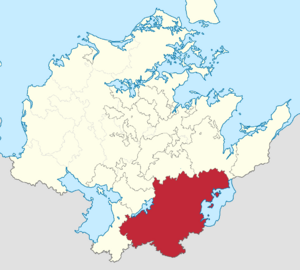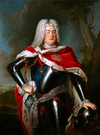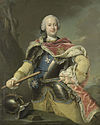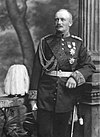Kingdom of Adwinia: Difference between revisions
No edit summary |
No edit summary |
||
| Line 68: | Line 68: | ||
The '''Kingdom of Adwhin''' ({{wp|German language|Hesurian}}: ''Königreich Adwhin'') was a {{wp|sovereign state}} and [[Mascylla|Mascyllary]] {{wp|kingdom}} that succeeded the powerful Duchy of Adwhin with the merger of the Duchy of Phalagay in 1710 and continued to play a major role in Mascyllary politics until 1923. After the Treaty of Karlsburg that formalized the unification of both states, Albert I of Adwhin was proclaimed King in Breisgau on 1 August 1710. The territorial extent of Adwhin encompassed the Duchy of Adwhin, numerous secularised territories, the Bishopric of Großbeeren and parts of Gotia and Mernia. While the kingdom was federal in theory, Adwhin and the Sohlnar monarchy dominated its policies and ruled throughout its existance. | The '''Kingdom of Adwhin''' ({{wp|German language|Hesurian}}: ''Königreich Adwhin'') was a {{wp|sovereign state}} and [[Mascylla|Mascyllary]] {{wp|kingdom}} that succeeded the powerful Duchy of Adwhin with the merger of the Duchy of Phalagay in 1710 and continued to play a major role in Mascyllary politics until 1923. After the Treaty of Karlsburg that formalized the unification of both states, Albert I of Adwhin was proclaimed King in Breisgau on 1 August 1710. The territorial extent of Adwhin encompassed the Duchy of Adwhin, numerous secularised territories, the Bishopric of Großbeeren and parts of Gotia and Mernia. While the kingdom was federal in theory, Adwhin and the Sohlnar monarchy dominated its policies and ruled throughout its existance. | ||
With a gradual interest in expansionism and imperialism, combined with the ambitions to unify Mascylla under Adwhinish rule, it sought to contain its main rival, the [[Kingdom of Aldia]] through much of the 18th century after it had ended political cooperation with the weakening [[First Cuthish Empire|Cuthish Empire]]. Escalating actions by both parties ultimately culminated into the [[War of the Five Kings]] which was a decisive blow to the Adwhin monarchy, being forced to resign from its power status and surrendering its sovereignty to the [[Mascyllary Kingdom]] in 1793. It continued to exist until 1923, when its last king Theodor VII was forced to abdicate and seek exile in [[ | With a gradual interest in expansionism and imperialism, combined with the ambitions to unify Mascylla under Adwhinish rule, it sought to contain its main rival, the [[Kingdom of Aldia]] through much of the 18th century after it had ended political cooperation with the weakening [[First Cuthish Empire|Cuthish Empire]]. Escalating actions by both parties ultimately culminated into the [[War of the Five Kings]] which was a decisive blow to the Adwhin monarchy, being forced to resign from its power status and surrendering its sovereignty to the [[Mascyllary Kingdom]] in 1793. It continued to exist until 1923, when its last king Theodor VII was forced to abdicate and seek exile in [[Valimia]] following pressure by the [[Mascyllary Revolution]] after the [[Great War (Aurorum)|Great War]]. With the establishment of the short-lived Adwhinish Republic and finally State of Adwhin under the [[Mascylla|Crowned Republic of Mascylla]], Adwhin was organized at last into a parliamentary democracy. | ||
==History== | ==History== | ||
| Line 77: | Line 77: | ||
===Mascyllary Kingdom=== | ===Mascyllary Kingdom=== | ||
===Institutional reform and Mascyllary Revolution=== | ===Institutional reform and Mascyllary Revolution=== | ||
==List of Dukes and Kings of Adwhin== | |||
This list details all ''Dukes'' (1493–1711) and ''Kings of Adwhin'' (1711–1923). Every monarch was a member of the House of Sohlnar, having formed from the Freying, Breisgau and Oberfriedsburg Adwhinish lines with the unification of the respective duchies into the Duchy of Adwhin proper in 1423. In 1711, the Duchy merged with the Duchy of Phalagay after the victorious War of the Phalagay Succession in opposition to Aldian interests, and Duke Albert I proclaimed the ascension to the Kingdom of Adwhin in 1711. The monarchy continued to rule until the ramifications of the 1923 Mascyllary Revolution, seeing Theodor VII forced to abdicate and seeking exile in [[Valimia]]. | |||
{|style="text-align:center; width:60%" class="wikitable" | |||
|- | |||
! Name !! Portrait !! Birthday !! Reign start !! Reign end !! Family | |||
|- | |||
| '''Theodore Albert IV ''the Pious'''''<br>''Theodor Albert der Gläubige'' || [[File:Albert_IV,_Duke_of_Bavaria,_portrait_by_Barthel_Beham.jpg|100px]] || 15 December 1451 || 1 February 1493 || 14 November 1508<br>(aged 74) || Adwhin-Breisgau | |||
|- | |||
| '''William George I'''<br>''Wilhelm Georg'' || [[File:DH-Wilhelm_von_Bayern.jpg|100px]] || 20 March 1474 || 14 November 1508 || 22 April 1516<br>(aged 34) || Adwhin-Breisgau | |||
|- | |||
| '''Albert Christian II'''<br>''Albert Christian'' || [[File:Kurfürst_Christian_II._von_Sachsen_(Porträt).jpg|100px]] || 20 April 1475 || 22 April 1516 || 18 October 1545<br>(aged 70) || Adwhin-Breisgau | |||
|- | |||
| '''John Philip I'''<br>''Johann Philipp'' || [[File:Albrecht_V_Bayern_Jugendbild.jpg|100px]] || 25 January 1526 || 18 October 1545 || 1 July 1594<br>(aged 68) || Adwhin-Breisgau | |||
|- | |||
| '''John Frederick IV ''the Wise'''''<br>''Johann Friedrich der Weise'' || [[File:Arolsen_Klebeband_01_171_2.jpg|100px]] || 9 June 1545 || 1 July 1594 || 29 September 1633<br>(aged 88) || Adwhin-Freying | |||
|- | |||
| '''William George II'''<br>''Wilhelm Georg'' || [[File:Ernest_I,_duke_of_Saxe-Gotha-Altenburg.jpg|100px]] || 2 December 1604 || 29 September 1633 || 7 February 1657<br>(aged 52) || Adwhin-Freying | |||
|- | |||
| '''Louis Ernest I'''<br>''Ludwig Ernst'' || [[File:Joachim_von_Sandrart_-_Maximilian_I,_Elector_of_Bavaria.jpg|100px]] || 20 December 1626 || 7 February 1657 || 26 May 1692<br>(aged 65) || Sohlnar | |||
|- | |||
| '''Albert John I ''the Great'''<br>''Albert Johann der Große'' || [[File:Aŭgust_Mocny._Аўгуст_Моцны_(H._Rodakowski,_XIX).jpg|100px]] || 11 June 1660 || 26 May 1692 || 23 March 1725<br>(aged 65) || Sohlnar | |||
|- | |||
| '''Albert John II'''<br>''Albert Johann'' || [[File:August_III_the_Saxon.PNG|100px]] || 19 January 1701 || 23 March 1725 || 5 October 1745<br>(aged 44) || Sohlnar | |||
|- | |||
| '''Theodore Albert V'''<br>''Theodor Albert'' || [[File:Gottfried_Boy_001.jpg|100px]] || 20 April 1722 || 5 October 1745 || 25 December 1779<br>(aged 57) || Sohlnar | |||
|- | |||
| '''Charles Anthony III ''the Just'''''<br>''Karl Anton der Gerechte'' || [[File:Graff_-_Elector_Frederick_Augustus_III.jpg|100px]] || 29 February 1750 || 25 December 1779 || 7 May 1804<br>(aged 54) || Sohlnar | |||
|- | |||
| '''Theodore Albert VI'''<br>''Theodor Albert'' || [[File:Anton-sachsen.jpg|100px]] || 26 September 1778 || 7 May 1804 || 5 May 1843<br>(aged 64) || Sohlnar | |||
|- | |||
| '''Theodore Albert VII ''the Proud'''''<br>''Theodor Albert der Stolze'' || [[File:Friedrich_August_II_of_Saxony.jpg|100px]] || 16 February 1800 || 5 May 1843 || 15 November 1852<br>(aged 52) || Sohlnar | |||
|- | |||
| '''Mathilda Louisa ''the Good'''''<br>''Mathilda Luisa die Gute'' || [[File:Joseph_Karl_Stieler_-_Duchess_Marie_Frederike_Amalie_of_Oldenburg,_Queen_of_Greece.jpg|100px]] || 27 September 1809 || 15 November 1852 || 1 January 1861<br>''Death date:'' 7 October 1888 (aged 79) || Sohlnar-Marnich-Karlsweil | |||
|- | |||
| '''William George III'''<br>''Wilhelm Georg'' || [[File:Frederick_Augustus_III_of_Saxony.jpg|100px]] || 1 January 1843 || 1 January 1861 || 12 August 1887<br>(aged 53) || Sohlnar | |||
|- | |||
| '''John Augustus I'''<br>''Johann August'' || [[File:George_of_Saxony_by_Nicola_Perscheid_c1900.jpg|100px]] || 19 June 1844 || 12 August 1887 || 19 November 1921<br>(aged 77) || Sohlnar | |||
|- | |||
| '''Theodore Albert VII'''<br>''Theodor Albert'' || [[File:Albert_of_Saxony_by_Nicola_Perscheid_c1900.jpg|100px]] || 19 June 1844 || 19 November 1921 || 4 August 1923<br>(aged 80) || Sohlnar | |||
|- | |||
|} | |||
[[Category:Cuthland-Waldrich]] | |||
[[Category:Mascylla]] | [[Category:Mascylla]] | ||
[[Category:History of Mascylla]] | [[Category:History of Mascylla]] | ||
[[Category:History of Cuthland-Waldrich]] | |||
Revision as of 16:19, 5 October 2021
This article is incomplete because it is pending further input from participants, or it is a work-in-progress by one author. Please comment on this article's talk page to share your input, comments and questions. Note: To contribute to this article, you may need to seek help from the author(s) of this page. |
Kingdom of Adwhin Königreich Adwhin (Hesurian)
| |||||||||||||||
|---|---|---|---|---|---|---|---|---|---|---|---|---|---|---|---|
| 1710–1924 | |||||||||||||||
| Anthem: Hymne des Wilhelminus Saint William's Hymn | |||||||||||||||
 The Kingdom of Adwhin within the Mascyllary Kingdom | |||||||||||||||
| Capital | Breisgau | ||||||||||||||
| Common languages | Hesurian (official) | ||||||||||||||
| Government | Absolute monarchy (until 1793) Constitutional monarchy (from 1794) | ||||||||||||||
| King | |||||||||||||||
• 1710–1725 (first) | Albert I | ||||||||||||||
• 1891–1923 (last) | Theodor VII | ||||||||||||||
| Legislature | Landtag | ||||||||||||||
| Kammer der Herren | |||||||||||||||
| Kammer des Volkes | |||||||||||||||
| Historical era | Early modern period – Interwar period | ||||||||||||||
• Treaty of Karlsburg | 1710 | ||||||||||||||
• Coronation of Albert I | 1 August 1710 | ||||||||||||||
• Law of Adwhin adopted | 22 February 1775 | ||||||||||||||
• Battle of Auserburg | 24 June 1786 | ||||||||||||||
• Personal union with Holnia | 1787-1793 | ||||||||||||||
| 23 May 1793 | |||||||||||||||
• Abdication of Theodor VII | 12 September 1923 | ||||||||||||||
• End of the Mascyllary Revolution | 26 January 1924 1924 | ||||||||||||||
| Currency | Golden 1710-1791 Reichsthaler 1791-1793 Karning 1794-1923 | ||||||||||||||
| |||||||||||||||
| Today part of | |||||||||||||||
The Kingdom of Adwhin (Hesurian: Königreich Adwhin) was a sovereign state and Mascyllary kingdom that succeeded the powerful Duchy of Adwhin with the merger of the Duchy of Phalagay in 1710 and continued to play a major role in Mascyllary politics until 1923. After the Treaty of Karlsburg that formalized the unification of both states, Albert I of Adwhin was proclaimed King in Breisgau on 1 August 1710. The territorial extent of Adwhin encompassed the Duchy of Adwhin, numerous secularised territories, the Bishopric of Großbeeren and parts of Gotia and Mernia. While the kingdom was federal in theory, Adwhin and the Sohlnar monarchy dominated its policies and ruled throughout its existance.
With a gradual interest in expansionism and imperialism, combined with the ambitions to unify Mascylla under Adwhinish rule, it sought to contain its main rival, the Kingdom of Aldia through much of the 18th century after it had ended political cooperation with the weakening Cuthish Empire. Escalating actions by both parties ultimately culminated into the War of the Five Kings which was a decisive blow to the Adwhin monarchy, being forced to resign from its power status and surrendering its sovereignty to the Mascyllary Kingdom in 1793. It continued to exist until 1923, when its last king Theodor VII was forced to abdicate and seek exile in Valimia following pressure by the Mascyllary Revolution after the Great War. With the establishment of the short-lived Adwhinish Republic and finally State of Adwhin under the Crowned Republic of Mascylla, Adwhin was organized at last into a parliamentary democracy.
History
Foundation and expansion
Political and economic dominance
Rivalry with Aldia
Adwhin and Mascyllary unification
Mascyllary Kingdom
Institutional reform and Mascyllary Revolution
List of Dukes and Kings of Adwhin
This list details all Dukes (1493–1711) and Kings of Adwhin (1711–1923). Every monarch was a member of the House of Sohlnar, having formed from the Freying, Breisgau and Oberfriedsburg Adwhinish lines with the unification of the respective duchies into the Duchy of Adwhin proper in 1423. In 1711, the Duchy merged with the Duchy of Phalagay after the victorious War of the Phalagay Succession in opposition to Aldian interests, and Duke Albert I proclaimed the ascension to the Kingdom of Adwhin in 1711. The monarchy continued to rule until the ramifications of the 1923 Mascyllary Revolution, seeing Theodor VII forced to abdicate and seeking exile in Valimia.


















